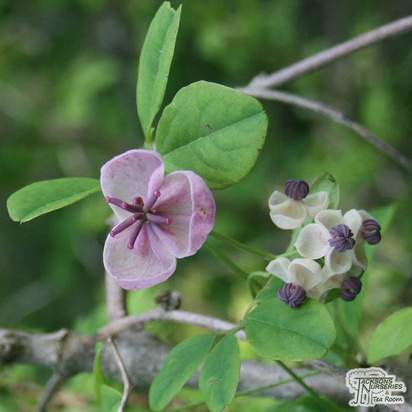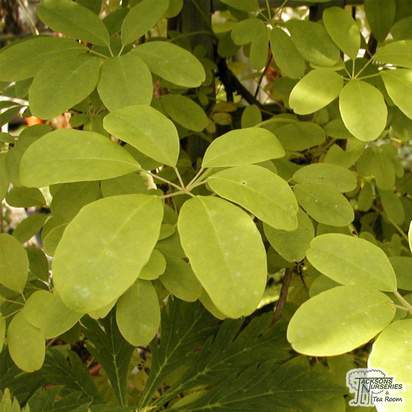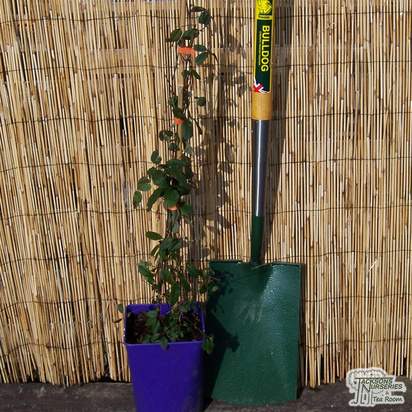A semi-evergreen, trailing climber with scented purple-maroon flowers in the spring, which are often followed by very unusual, elongated purple fruits during a long, hot summer. The flower petals are thick, almost waxy and are clustered along the stems. Each one produces a beautiful vanilla scent, much prized by gardeners. In milder areas the leaves will remain throughout the winter months.
In China, Akebia quinata is referred to as "mu tung" meaning "perforated wood", also occasionally known as "tung tsao" meaning "perforated grass". Although they look striking when planted alone, they do combine beautifully with the early flowering Clematis cirrhosa var. purpurascens 'Freckles' and Clematis armandii, or with the ornamental leaves of Vitis vinifera Purpurea.
Ideal for planting over trellis, pergola or training up a wall where its scented flowers can be used to best effect. Thrives in most soils and most aspects, but doesn't appreciate root disturbance. They are best grown in warm gardens as the beautiful flowers are prone to damage from late frosts. These are vigorous growers and may require some climbing support.
Buying Climbers from Jacksons Nurseries
Unlike many garden centres, supermarkets and some nurseries here at Jacksons Nurseries we sell the majority of our stock all year round. Our stock is for the most part grown outdoors making it far hardier than those grown under glass and/or only sold ‘In Season’.
Here at Jacksons Nurseries we would favour a hardy outdoor grown plant every time. They are far less likely to suffer from the shock of being planted in colder conditions and they will begin to establish more rapidly the following spring. This can mean that they don’t look like a ‘picture perfect’ plant when purchased out of season but with the correct care and a little time you’ll have a wonderful plant to enjoy for many years to come.
Availability: Stock availability figures are provided as a guide only. There is a delay between orders being placed and the plants being gathered by our pulling team. During this time it may be possible for a member of the public to purchase these plants from our Garden Centre, while this is rare it is a possibility and we will notify you of any problems as soon as possible. This figure may also include plants that have not yet be flagged as unsaleable.
Pre-order: Pre-order times are given as a guide only and may vary dependent on the growing season. Orders containing Pre-ordered products will be shipped as a single order when all items become available. Large orders may be part shipped, please contact us on 01782 502741 or email sales@jacksonsnurseries.co.uk.
Climbing plants are used to cover arches, obelisks, pergolas, fences and buildings. They can also be used to cover up unsightly features and masonry. True climbers take up little ground space and are perfect for small gardens. Wall shrubs, on the other hand, require more ground space.
A lot of climbers have the natural tendency to climb, and won’t need supports or to be tied-in. Wall shrubs, however, don’t climb naturally but they can be trained to do so. If left untrained, wall shrubs will bush outwards and grow like normal shrubs.
Planting and Conditions
Climbers can be planted at any time of year as long as the ground is not frozen or waterlogged. Autumn is the best time for planting deciduous climbers because the soil is warm enough to encourage some growth before winter comes. This will help the climber establish quickly so that the plant will be able to withstand dry, hot weather during the following summer.
Evergreen climbers can also be planted in the autumn, but it is better to plant them in the spring if your garden is exposed. This allows them to become established before the cold weather comes.
Vulnerable climbers can be protected over the winter months by covering them in a layer of insulation, such as a garden fleece.
To guarantee success, climbers should be planted somewhere there is suitable support. If it is able to climb without supports, then the wall or fence that it is climbing against should be in good condition. If you are planting a climber against a wall or fence, make sure you leave around 30 – 50cm from the wall to avoid the dry soil that is characteristic of these areas.
Climbers should be planted at the same depth as the pot. Water the plant thoroughly after planting, especially in the first few years and during bad weather. Plants against walls may not receive as much rainfall as the plants in the rest of the garden.
The type of soil that you will need will vary from climber to climber. Clematis, for example, tend to prefer soil that is moist, but well-drained. Hardiness will also vary from climber to climber, but tender plants should not be planted until the spring, and they should not be planted in an exposed area. Hardy climbers include ivy and Russian vine. Some varieties of clematis are hardier than others.
Aftercare and Pruning
Regular pruning will keep your climbers and wall shrubs tidy and full of flowers. Some climbers do have particular requirements. If a climber is left unpruned, renovation of the plant may be necessary.
Climbers should be watered well during dry spells. In the spring months, application of a fertiliser that is high in potassium should be used to feed the plant. Mulch it with organic matter, but leave at least 10cm free of mulch around the bark so that it doesn’t rot.
Potential Issues
Climbers and wall shrubs can suffer from diseases and pest problems. These include powdery mildew, aphids, scale insects, root rot and root rust, mealybugs.
These can be treated with a variety of sprays and pesticides or, if you’d rather not use them, simple removal of effected parts of the plant. Sometimes biological controls such as parasitic wasps and ladybirds can help in the fight against mealybugs.
No posts found







